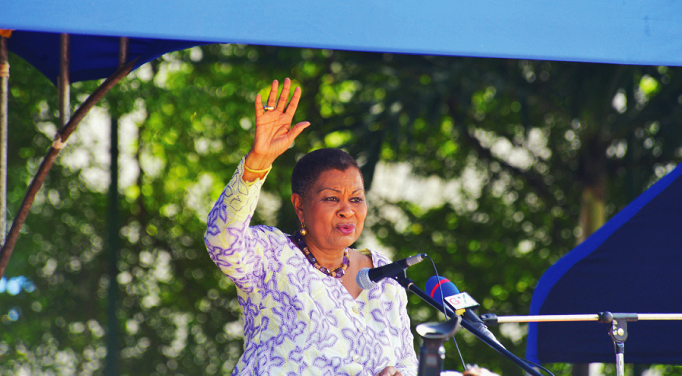Courage was famously defined by the American writer and Nobel laureate, Ernest Hemingway (1899 – 1961), as “grace under pressure”. That definition resonated with Dr Joyce Aryee’s remarks to pupils from the Crimson Dawn Junior High School (JHS) of Akosombo when she said:
“We learn because we want to get to the knowledge about something; we need to analyse the knowledge; we need to think through the knowledge; we need to apply the knowledge, so if we want to have a changed mind that focuses on what is right, we need courage.”
Joyce Aryee's assertion was most articulate, echoing tones from William Shakespeare: “Screw your courage to the sticking-place, / And we’ll not fail.”
Never fear to stand alone
Clearly one of the most gifted speakers in Ghana - and speaking right off the cuff - Dr Joyce Aryee stressed: “Learning is not just the way we have been doing it, and I am sure that after listening to Uncle Anis you recognise now that learning needs to take a different turn, right? Yes, we learn not because we just want to go and regurgitate information, to give back to the teacher everything they gave us; no, that is not learning.”
Relating to pressures from the status quo – family or peer pressure from friends – to stray off one’s defined course, Dr Joyce Aryee alluded to the biblical characters Esther and David, and said, “Never fear to stand alone if you believe you’re in the right.” She continued: “We have to be determined and focused to be in the right path of success. We sense that there is something in us that we need to develop to be able to make a meaningful impact in our generation. In fact, all of us need to recognise that we need to add value to ourselves through the way we get educated. We learn to learn. You have to learn to learn; you know that?”
And when better to prepare young people for a brighter future than right from their childhood. And that is why it was so appropriate for the proprietor of Corricrech/Crimson Dawn JHS, Mrs Corrine Sackey, to respond to the need through an Educamp retreat at the Pentecost Convention Centre, Gomoa Fetteh, Central Region, (March 2-5, 2018) for her JHS students. The Educamp topics included “Emotional Intelligence for an enhanced self-confidence” and “Adolescent reproductive health”.
My two presentations were on presentation skills as learning strategies and career planning.
Presentation secrets
Presentations have become the de facto tool of communication across disciplines and boundaries; in other words, you not only tell your story – you show it.
In any presentation, the key is to adhere to the four criteria defined as follows: 1. The evidence of preparation through knowledge/mastery of the subject to be delivered; 2. Body language exuding confidence through poise and proper comportment; 3. Making eye contact with the audience so that both the speaker and listeners feel each other; and 4. The nature of the delivery must engage the audience’s interests at all times through the speaker’s enthusiasm and subtle waves of fun.
Once the criteria was established, the expectations were modelled through demonstrations or guided practices. Then, peer evaluation becomes appropriate through scoring of group presentations along the following rubric: four points for very good; three points for good; two points for merely satisfactory; and one point for poor. It’s important that the pupils themselves own the contents, process and judgement without undue interference by adults.
Career planning
Some young people come to school with career interests, values or convictions already in place. And for those who don’t, they need to be apprised of such possibilities. As Richard Branson of the Virgin Atlantic fame put it, “Everyone has something valuable to bring to the table.” And one may add: if you are not at the table, you’re on the menu. That is to say, the world does not wait for people to be ready; and those that choose to stay passive do so at our own peril, to be unduly taken advantage of by others.
Two tweets by Fred Swaniker of the African Leadership University come to mind to help raise awareness. He said, “Start young and get lots of practice if you want to be an entrepreneur. Don’t dismiss the ‘small’ projects you do today.” He added: “A moonshot thinking refers to a big, bold audacious goal that is beyond most people’s imagination when it is conceived; it’s what Africa needs.”
Steve Jobs
Know that the job you do for a living is one thing; the work you were born to do is another thing. And that raises the question: What do you want to live for? The question prepares every potential entrepreneur to discern a greater and wider horizon as they begin to think of careers.
As Steve Jobs put it, “You’ve got to find what you love. Your work is going to fill a large part of your life, and the only way to be truly satisfied is to do what you believe is great work. And the only way to do great work is to love what you do. If you haven’t found it yet, keep looking. Don’t settle.”
My concluding advice to the youth: Be a brand; be the go-to person; be a lifelong learner; select mentors who fit your interests and develop your own unadulterated values.

